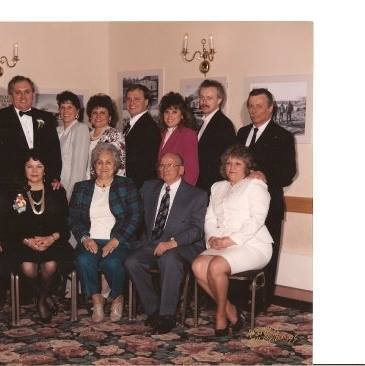If the colonizer didn’t write it, it didn’t happen, right?
 Mashantucket Pequot Tribal Chairman Skip Hayward (back row left) and his family in an early photo in Mashantucket (My photo)
Mashantucket Pequot Tribal Chairman Skip Hayward (back row left) and his family in an early photo in Mashantucket (My photo)By Trace Hentz (blog editor)
In 1999, when I took the Pequot Times editor job inConnecticut, I’d tried to read as much as I could find about New England “Indians”and especially the Mashantucket Pequot Tribal Nation. I’d found a book “The Spiritof New England Tribes” in a bookstore on the Cape, and fortunately I read itcover to cover before I took the job. Butit wasn’t enough and I knew that. Booksfor the general public were hard to find, and I think that was on purpose. “Weare not supposed to know,” and I have written that headline often. And it’s true.
If the colonizer didn’t write it (in books), it didn’thappen. Got it?
As part of our introduction to the tribe, when we are hired,we watch the film, THE WITNESS, at the Pequot Museum. It gives a glimpse of thehistory that lead to a massacre at Fort Mystick in the 1600s. It’s so hard toput into words but it was brutal and traumatic to watch, and then to comprehend. Killing women, children, and elders, shooting them as they tried to escape the burningfort, that was a wake-up call for me. What kind of monsters would do that?(Well, if you look up massacres, there are over 1000 documented in this placewe call America.) It’s something we are notsupposed to know.
Later I was asked to give a history talk for Foxwoodsemployees and most employees seemed (to me) to be clueless (but interested) in earlyhistory in this part of Connecticut. A lack of history causes suspicion andthat was the case with many people I met. They felt or said out loud, the Pequot werenot real “Indians.” Well, that was nottrue and it took a lot of writing and research in the Pequot Times every month to counter that falsehood. (I worked there5 years.) The only way to counter ignoranceis with TRUTH. So I searched and published“Genocide and Enslavement of the Pequot” by Dr. Kevin McBride, who was the directorof the Pequot Museum’s Research Center. I heard him give a talk at Yale andasked if I could publish it.
Just being here in New England, I could tell right away theyhide history, lots of it. It might upsetpeople, I guess? In 2000, I wrote apaper on Native slavery called “First Contact” and gave a short talk at the NativeAmerican Journalist’s conference in Florida. Many of the best Native journalists I knewwere surprised about the slavery part, but knew something about massacres.
Yes, in some tribes they do teach about colonization and first contact with non-Indians, slavery, massacres, but not all tribes.
Did you enjoy your history class in school? I remember theyfocused on the Nazis and Jews and world wars. Why didn’t we learn about American atrocity, starting in the 1600s right herein New England? What about Slavery?
I asked the research center to give me as much as they couldso I could publish it. As an editor, it’s our job to educate, offer news, and sneak in some realhistory when possible.
I call myself a citizen journalist now, and part-historian.I am still very interested in Native Slavery. My prayer was answered when I saw that BrownUniversity (in Rhode Island) had a presentation on this topic in June. Challenge yourself to keep learning, please.
Please click: www.stolenrelations.org (scroll downto see the June talk)
(To be continued)
Questions? EMAIL: tracelara@pm.meTrace A. DeMeyer's Blog
- Trace A. DeMeyer's profile
- 2 followers



